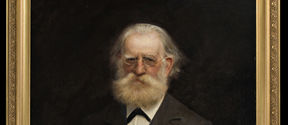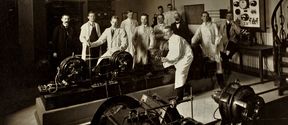The position of professor of mechanical engineering which had remained vacant since 1908 was filled by Hamburg Technicum senior teacher Ernst Tuckermann, Dr.Eng., who was interested in the position and began work in early September 1911.
Ernst Tuckermann was the first full-time professor at the Technical University of Finland. In an agreement between the university and the Trade and Industry Commission, the university undertook to ensure that, after two years, Tuckermann would be able to communicate with students in both native languages at least in part, and to remain in the position for at least five years.
The outbreak of the First World War in the summer of 1914 led to a truly awkward situation for mechanical engineering education. Tuckermann, still a German citizen, had his work interrupted after the war broke out between the Russian Empire and Germany, just as he had returned to Helsinki. Facing an impossible situation, Tuckermann sent a letter to the university on 2 August 1914, asking for leave and for the university to arrange his move back to Germany. He acted hastily, as the governor-general's deportation order did not arrive until the next day.
Deportation
Tuckermann left Helsinki without his belongings on a special train for deportees, passing through Tornio on the evening of 3 August, and in the beginning of autumn he no longer attended teacher meetings. A letter was sent to the authorities in late August stating that representatives of enemy countries eligible for military service had to be arrested as prisoners of war.
The incident was a great loss to the university. Over the past few years, Ernst Tuckermann had managed to establish good relations with the Finnish engineering community. On 22 September, the Trade and Industry Commission stated that Tuckermann's post had to be kept open until the end of the five-year term, with the idea that the professor would return after war – which was expected to end swiftly – was over.
Harald Kyrklund, a fresh engineering graduate, was hired to replace Tuckermann in 1917. During the war years, mechanical engineering education was dependent on temporary solutions.
In the fall of 1918, Tuckermann unsuccessfully applied for compensation for the loss of his tenure and for the title of professor. The university had to consider the exceptional matter for a long time and ended up awarding Tuckermann the title of professor but no compensation on the proposal of Professor Hannelius. The breach of contract was, according to the statement in the minutes, due to 'supernatural reasons'.
Ernst Tuckermann later returned to Finland and worked as a teacher of steam engine technology at Tekniska Läroverket i Helsingfors from 1919–1940.

